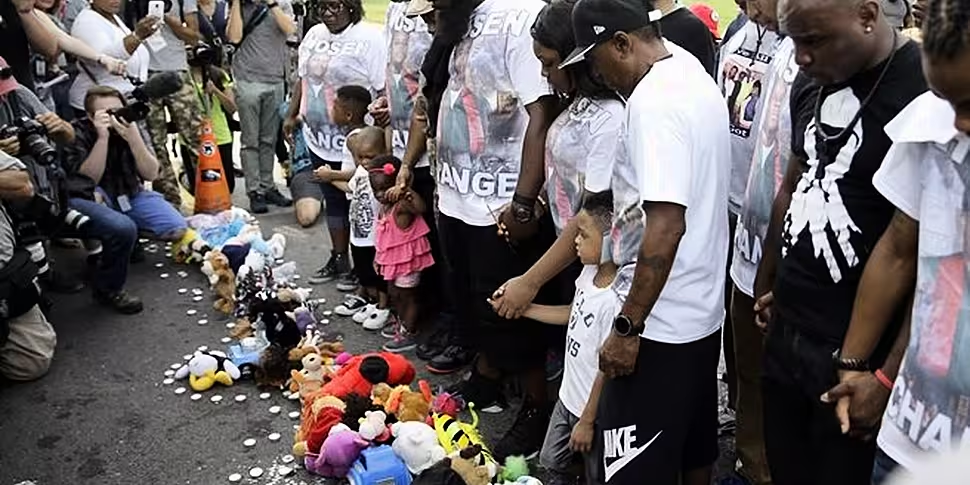On February 26th 2012, George Zimmerman shot and killed Trayvon Martin, the fallout of which almost singularly resulted in the Black Lives Matter movement.
Zimmerman was the neighbourhood watch coordinator for the gated-community in which he lived in Florida, and at the time, Martin was also a resident there.
On the night in question, Zimmerman rang the local police, claiming: "We've had some break-ins in my neighborhood, and there's a real suspicious guy"; "This guy looks like he is up to no good or he is on drugs or something"; and "these assholes, they always get away."
When Martin began to run back in the direction of his home, Zimmerman gave chase, and eventually rang the police back. According to Zimmerman, a violent interaction took place, which resulted in Martin being shot dead just 70 yards from the back door of the house he was staying in.
Reaction to Martin's death
Within days of the murder here were already protests taking place around the U.S. calling out for his arrest. Martin's mother created a petition on Change.org, also calling out for his arrest. It received over 2.2 million signatures, the biggest petition even in the history of the website.
Walks out were staged in schools and colleges all over Florida, and the OccupyWallStreet campaign marched in solidarity with the "Million Hoodie March", which was created when speculation over Martin's attire was used as reasoning for his murder.
On April 11, 2012, Zimmerman was charged with second-degree murder in Martin's death. The trial began on June 24, 2013, and was presented to the jury for deliberations on July 12. Zimmerman was found not guilty the following day.
The state attorney ruled that Zimmerman had acted in self-defence, and due to Florida's "Stand Your Ground" law, there would be no charges pressed against him.
Chris Serino, the lead detective in the case, issued a warrant for arrest against Zimmerman, claiming charges of negligent manslaughter: "The encounter between George Zimmerman and Trayvon Martin was ultimately avoidable by Zimmerman, if Zimmerman had remained in his vehicle and waited the arrival of law enforcement or conversely if he had identified himself to Martin as a concerned citizen and initiated dialog in an effort to dispel each party's concern. [...] There is no indication that Trayvon Martin was involved in any criminal activity at the time of the encounter."
Once again, the State Department determined there was not enough evidence to back the charges.
Reaction to Zimmerman's acquittal
The day the acquittal was announced, Alicia Garza took to Facebook to comment on the events, writing a letter to her fellow black men and women in America, telling them all to remember "that black lives matter".
Her friend Patrisse Cullors spotted the post and put in on Twitter, adding in the hashtag #BlackLivesMatter - and from there, a movement was born.
Garza is special projects director for the National Domestic Workers Alliance, which fights for labor protections for nannies, housekeepers, caregivers and other domestic workers. Cullors is executive director of the Coalition to End Sheriff Violence in L.A. Jails. Immigrant rights activist Opal Tometi, meanwhile, runs the Black Alliance for Just Immigration.
All three friends came together to create the online platform Black Lives Matter.
Since then, the simple hashtag has been used by countless celebrities and politicians, used as campaign slogans and pasted on t-shirts, becoming a modern day version of "Black Power".
Since then, other hashtags have also been created in the aftermath of racially-infused deaths, including #ICantBreathe and #HandsUpDontShoot.
The future of Black Lives Matter
In the wake of the deaths in Louisana and Minnesota, #BlackLivesMatter has once again, powerfully and unfortunately, been brought to the fore once again.
And now, after the events in Dallas - in which five police officers were shot and killed as they overlooked an otherwise peaceful Black Lives Matter march through the city - it has not only become a beacon of hope, but also a target for hate.
In what had been a very even-handed approach to a very insidious problem, the aftermath of this shooting could result in a heavy-handed approach to any and all future BLM marches and protests, turning what was once a potential avenue for peace into something much more fearful.
The full effect of what happened in Dallas probably won't be realised for days, weeks or even months - but the fact remains that five police officers were killed in direct relation to something that started life as nothing more than a hashtag.
Whoever makes the next move, and whatever that move is, will be vitally important in taking the next step towards a peaceful resolution - rather than another step backwards into hate and fear.









